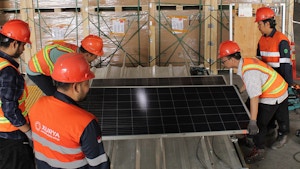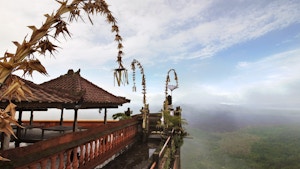Southeast Asia's Clean Energy Transition
All our latest stories. Back to Sea's Clean Energy Transition.

A South Korean law to ease tensions with fisherfolk could face months of delays after missing the legislative polls deadline, while more conflicts are surfacing in the Philippines. Can tighter financing criteria help avoid disputes?

Economist Michael Greenstone, who first put a price on emissions for the US government, says that unless the price gap between fossil fuels and clean energy narrows, poor countries will face difficult trade-offs amid climate breakdown.

SDG 12. Consumption
Can joint financing for Asian manufacturers help clean up fast fashion’s supply chain?
There is a disconnect between brands' pursuit of decarbonisation targets and the provision of financing to their suppliers. Companies such as H&M are now working with banks in the region on new loan structures to support factory upgrades. Will that make a difference?

As floating photovoltaic systems emerge as a bright spot in the Philippines' renewable energy quest, how can the archipelago push expansion while minding the technology's potential environmental and social impacts?

The region leads the world in the growth of solar and wind certificate issuances. Such deals are helping developers secure funding and take off in nascent markets, amid accusation that companies buying RECs inflate their green claims.

Asia’s sustainability heads foresee some relief from reporting burdens this year, but articulating the financial value of social, biodiversity and climate-related impacts, engaging suppliers and staying ahead of regulations will keep them busy.

SDG 13. Climate
Philippines needs US$9bn and better foreign funding approach for energy transition: Rockefeller Foundation
Just Energy Transition deals have been “long on promise but short on progress”, the US-based philanthropic group says. It recommends countries iron out investment plans before making big political statements.

As Indonesia heads for the polls, Eco-Business assesses which of the three major presidential candidates has the strongest position on climate and environmental justice.

SDG 11. Cities
Clean energy policies in SE Asia improving but chronic issues impact payouts: SEACEF green fund manager
Clime Capital will raise its financing cap after winning blended finance backing for its regional early-stage funding scheme. But it has to “risk-gate” disbursements to keep clear of regulatory deadlocks.

Leaders Vietnam and The Philippines are facing delays in developing renewable energy projects, while unambitious Asean targets allow countries to continue developing coal and gas, says Global Energy Monitor.

As the island recovers from a pandemic-induced slump, it is trying to diversify its economy beyond tourism and attract green business. But can eco-startups scale or is Bali more beach than business?

Several commitments have been made in 2023 to boost clean energy in the region, and observers are now looking for signs of real action. Meanwhile, solar manufacturers could be in for a bumpy ride.


Transforming Innovation for Sustainability Join the Ecosystem →


